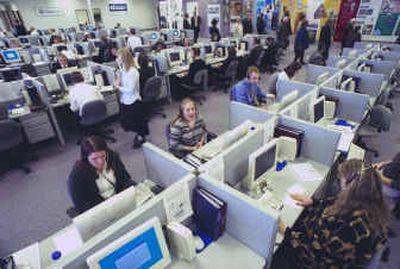Missionaries return speaking prized languages

BOISE – When McKay Jensen returned to his native Idaho after two years on a Mormon mission in Montreal, he figured his fluent French wouldn’t be much use in a state more famous for french fries than French speakers.
But now he uses it daily to deal with French-speaking Canadian distributors for Melaleuca Inc., a health-products company that operates a call center in tiny Rexburg, Idaho.
Employers ranging from Melaleuca to online auction house eBay, the FBI in Salt Lake City, and eye-care company 1-800 Contacts in Draper, Utah, are capitalizing on the language skills required for the Church of Jesus Christ of Latter-day Saints’ far-flung evangelism.
“I got an e-mail that Melaleuca was looking for French speakers,” Jensen said. “Where else would I get that opportunity, here in Rexburg?”
About 32,000 Mormon missionaries are stationed outside the United States, most in countries where another language is crucial to their mission.
And every year, thousands return to strongly Mormon Idaho and Utah, fluent in Japanese, Chinese, Korean, German, Spanish and dozens of other languages.
“Because of the returning missionaries, there are an abundance of individuals with high-level language capabilities returning to the Intermountain West,” said Joseph Ogden, assistant dean at the Marriott School of Management at Brigham Young University in Provo, Utah.
At the Missionary Training Center in Provo, 1,100 instructors teach 48 languages.
Even as customer-service call centers look overseas to cheap labor markets in India and elsewhere, returned missionaries can allow U.S. companies to open foreign-language operations here.
“You may be willing to pay more to keep your call center closer to home, within striking distance of your corporate headquarters,” said Keith Dawson, editorial director at Washington, D.C.-based Call Center magazine.
Former missionaries at companies in Idaho and Utah appreciate the irony that they can use exotic language in a largely Mormon and overwhelmingly white region of the country.
“I pretty much assumed I’d end up on the East or West Coast, doing this type of international career,” said Mark Warburton, an executive at Nu Skin Enterprises, a Provo-based skin-care company, who learned to speak Japanese during a mission 15 years ago. “To be able to stay in familiar surroundings with family and friends was a nice benefit.”
Warburton started at Nu Skin’s Provo call center. Later, he opened its Japanese business in 1993, and just ended a seven-year stint in Japan in 2004.
Elsewhere, others have also advanced.
“A few months after I got home from my mission in Chile, I started working at Melaleuca at the same time I was going to school,” said Kevin Sommer, 25, a graduate of Brigham Young University-Idaho who now helps manage the Rexburg call center.
Relatively low labor costs and abundant recreational amenities helped prompt eBay to start an operation in Salt Lake City, but the language skills of returned missionaries was a bonus.
“As eBay has grown internationally, in 32 markets, those language skills do become important,” said Hani Durzy, a spokesman for the San Jose, Calif., company.
Thirty-five percent of eBay’s Salt Lake City staff speaks a second language, Durzy said.
The FBI has maintained a regional translation center in Salt Lake City since 1996 and generally finds returning missionaries attractive candidates, said Michelle Jensen, a Russian linguist and supervisory language specialist.
“People with LDS mission backgrounds don’t have as much of a problem passing the background investigation,” Jensen said. “They have the language skills, plus they’re usually clean-cut.”
At Idaho’s Melaleuca, a privately held company with $634 million in sales in 2004, owner Frank VanderSloot once considered opening a call center in Montreal for his French-speaking customers.
Instead, VanderSloot, himself a Mormon, opted to expand in Rexburg. Now, French-speaking distributors of Melaleuca soap, lotion and cosmetics connect to workers in Idaho.
Direct numbers also link distributors with employees, often former missionaries, who speak Polish, Russian, Chinese, Korean and Spanish.
“We’ll be opening up the Netherlands,” VanderSloot said. “That’s where I went on my mission. I’ll get to practice. We’ll need them (Dutch-speakers) here some time in the next year.”